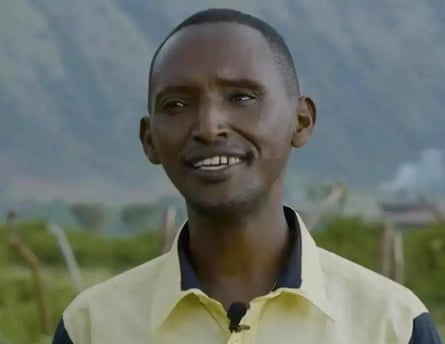A man campaigning against the controversial $5bn (£4bn) east African crude oil pipeline (EACOP) is recovering in hospital after an alleged beating by the Ugandan armed forces in the latest incident in what has been called an “alarming crackdown” on the country’s environmentalists.
Stephen Kwikiriza, who works for Uganda’s Environment Governance Institute (EGI), a non-profit organisation, was abducted in Kampala on 4 June, according to his employer. He was beaten, questioned and then abandoned hundreds of miles from the capital on Sunday evening.
In a post on X, the EGI said: “Stephen was found abandoned on the side of the road last night in Kyenjoyo. Thankfully, he is alive, safe.
“Unfortunately, he is in poor condition after enduring severe beatings, mistreatment, and abuse throughout the week,” the environmental organisation said. “Doctors are conducting various examinations.”
The Uganda People’s Defence Force denied it was responsible and accused Kwikiriza of faking his abduction. Col Deo Akiiki, the military’s deputy spokesperson, said: “It has been established that the said person is totally deceiving. All facts have been established. We are in touch with police and his organisation to know his intentions of telling such lies.”
According to the International Federation for Human Rights, Kwikiriza is one of 11 campaigners against oil projects who have been targeted by Ugandan police, military or government officials in the past two weeks.
In November a further group of 11 students were arrested and are still awaiting trial after staging a peaceful march against the pipeline in Kampala.

Sacha Feierabend, the federation’s programme officer for human rights and the environment, said there had been an “uptick of repression” against activists in the country’s “western oil frontier” since the end of May.
The EACOP plans, backed by the French oil company Total and the state-owned China National Offshore Oil Corporation, with the Ugandan and Tanzanian governments holding minority stakes, has attracted widespread criticism from environmentalists since it was first mooted in 2013. They claim the route endangers several national parks and will displace tens of thousands of people from their homes.
At least 47 protesters have been detained or arrested by Ugandan security forces since September 2020, some more than once, according to an analysis conducted last year by Global Witness.
Kwikiriza had been reporting on alleged human rights abuses around the Kingfisher oilfields on the shores of Lake Albert. Oil from there will be transported along the 870-mile EACOP, which will run between Uganda and the Tanzanian coast.
Kwikiriza had previously received threats from the Ugandan army, according to the EGI’s chief executive, Samuel Okulony. He said there had been increasing violence because “the campaign against stopping oil activities in Uganda has been succeeding”.
Analysis conducted in 2022 revealed that over the 25-year lifespan of the pipeline, the transport, refining and burning of the oil would produce 379m tonnes of global carbon emissions.
Some western banks have declined to fund it and campaigners were now focusing their efforts on potential Chinese funders, Okulony said. Chinese funding is considered pivotal to the project. Uganda’s energy minister travelled to Beijing in April to discuss the pipeline, Reuters reported.
TotalEnergies E&P Uganda (TEPU) said it was aware of reports about Kwikiriza and was “relieved to hear of his release and hope for his full recovery”.
It added: “TEPU is continuing to monitor the situation and seeks to understand the facts surrounding this situation.
“We reaffirm that TEPU does not tolerate any threats or violence against those who peacefully defend and promote human rights. We have always reminded our associated parties of the importance of respecting human rights.”
Source: theguardian.com


















